
The Handiham World Weekly E-Letter for the week of 26 July 2006
This is a weekly news & information update from Courage Center's Handiham System. Please do not reply to this message. Use the contact information below, or simply email handiham@courage.org. For subscribe/unsubscribe information, please see the bottom of the page.
Listen in MP3 or RealAudio, later in the day, after podcast audio is posted. The text of the e-letter must be mailed before the audio is put on the website in order to get news out as quickly as possible. Audio appears later in the same day, so if you check too early, the instant this mailing arrives, you will hear last week's audio:
 Streaming MP3:
Streaming MP3:
http://www.handiham.org/audio/handiham.m3u
Download the e-letter via accessible MP3:
http://www.handiham.org/audio/handiham.mp3
The Handiham podcast is at:
http://feeds.feedburner.com/handiham
 In this edition you will find:
In this edition you will find:
- Don't prepare - be off the air
- Avery's QTH: Freeloaders
- Do I hear $20? How about $25?
- HAMVENTION® attendance
- AT this week: Yikes! A shark!
- August magazine audio posted
- Camp one, camp all!
- Elmer comes out of hiding to answer an "open mike" question
- ...and lots of other stuff. Tune in today!
Greetings, everyone.
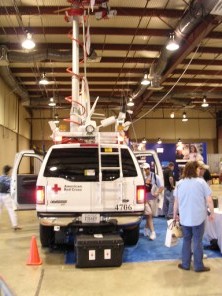 Picture: Red Cross truck at Dayton, complete with its own antenna farm.
Picture: Red Cross truck at Dayton, complete with its own antenna farm.
These are folks who are prepared. You should be, too.
Listen up, everyone. Hear the sound of a ham radio station that is unprepared during summer heat waves. (No sound!)
Yes, it's the disturbing sound of silence. When you don't prepare, you are off the air in a heat emergency that causes commercial power to drop!
This past week, there was an unusual coincidence of major power outages in New York City, California, and in the country's heartland, in St. Louis. The outages were protracted, too. I saw a news report about St. Louis that told of many power customers still being in the dark after more than a week following severe storms. In New York, the source of the overload conditions hadn't been found, making more outages a real possibility. California, in the grip of a record heat wave, saw many customers losing power last Sunday. According to CNN, a record 50,270 megawatt peak was reached in California - that's one heck of a lot of power! And that number was reached despite efforts by businesses to cut back on power usage following a plea by Governor Arnold Schwarzenegger.
Scientists have reported that globally, 2005 was the hottest year on record, and according to a report released from NOAA's National Climatic Data Center in Asheville, N.C., the average temperatures of the first half of 2006 were the highest ever recorded for the continental United States.
Since power grids become more brittle and likely to fail during extreme heat events, ham radio operators everywhere should be planning ways to stay on the air when commercial power is not available. Your own plan can be quite simple; just keep a handheld radio with a charged battery pack and several spares available to make it through short outages. However, the folks in New York and St. Louis would go through those batteries in a day or two, even with modest usage. That's when you have to plan for either more battery capacity, as in larger storage cells, or some way to charge batteries without the power mains. Here are several options:
- Solar cell chargers: You can build your own, or buy a solar car battery charger for about the price of a 12 VDC 20 amp power supply.
- A high capacity trickle-charged battery can keep you on the air during brief outages. Some hams run their stations all the time from trickle-charged automotive batteries or gel cells. There are station design considerations for safe use of such batteries, so do your homework. Some batteries can vent dangerous gases in normal use.
- A portable gas generator. Use it for Field Day, but have it ready to go during summer heat. Hint: It won't run without gasoline, which may be hard to come by in a widespread power outage, so you will need to consider how to safely store this volatile fuel!
- Buy an external battery pack for your HT, or a AA battery back, if your HT supports this feature. Then have extra AA cells on hand.
- Have several extra rechargeable battery packs available for your HT, and use your computer calendar to remind you to rotate them through the charger regularly. Nothing is worse than being called to an emergency or having a power outage, then discovering that all your batteries are dead!
The ARRL has some articles and resources about alternative and emergency power available online. This is a good place to read some basics. Find this and other relevant links in the RekkyTec Links.
Patrick Tice
patt@courage.org
Handiham Manager
Avery's QTH: Freeloaders
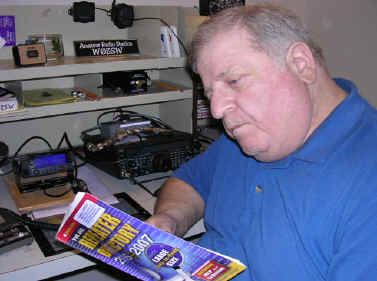 Picture: Avery studies the 2006-2007 ARRL repeater directory.
Picture: Avery studies the 2006-2007 ARRL repeater directory.
Welcome once again to my humble QTH.
One weekend I was looking for something to do, so I turned on my two meter rig. I chose my club's repeater frequency, as I was planning to talk to a couple of my long-time club buddies.
Hmmm... I found a conversation already in progress; a couple of unfamiliar people involved in a QSO. I thought I would just wait for them to finish and then use the repeater myself.
Gosh! They seemed to on talking forever and ever! One subject after another came up and was hashed over.
"Well, OK." I thought to myself. I will just go do something else until they are done."
Several hours later I thought I would give it another try. By Golly! They were still there! Still talking about nothing of much importance. Had they asked permission to use the repeater? NO! Did they make any effort to join the club? No! Freeloaders, for lack of a better word, are what they were. What is worse is that this went on for several evenings and weekends.
Putting a repeater on the air involves a considerable amount of expense. The cost of the repeater, its antennas, and possibly site rental, are all part of the bottom line. Since this was a wide-area metropolitan system, it meant rental of a couple of separate transmitter and receiver locations and phone lines.
Those phone lines for repeater controls represent a monthly expense that has to be paid. Parts for repairs, when necessary, have to be purchased. The electricity to keep the repeater running has to be paid on a monthly basis also. Someone has to put in their time, energy, and gas money to run out to the repeater's location to take care of upkeep.
Most everyone expects guests to use a repeater system for short periods of time, as when traveling through a city, or to meet someone else before moving to a simplex frequency. But when going on someone's repeater for a longer period of time, whether it is owned by a club or an individual, one should be sure to ask if it is OK first.
Suppose you want to make use of a really good repeater system more often than just casually. If it is sponsored by a club, join the club and pay your dues to help keep the repeater on the air. Who knows, you may even have fun taking part in some of the club's other activities like maybe operating in a contest or attending a picnic.
If you have equipment to donate, or if you are a person with a disability who would like to learn more about amateur radio, Just give me a call, toll-free, at 1-866-426-3442, or email me at
avery.finn@courage.org
Until next time, best 73 from K0HLA, Avery
Do I hear $20? How about $25?
 The ARRL may be giving eBay and the other auction sites a little competition in the Amateur Radio arena this fall when the first ARRL Online Auction gets under way. Auction proceeds will help to support the League's educational services and programs. The event now is in the planning stages, says ARRL Business Services Manager Deb Jahnke, K1DAJ.
The ARRL may be giving eBay and the other auction sites a little competition in the Amateur Radio arena this fall when the first ARRL Online Auction gets under way. Auction proceeds will help to support the League's educational services and programs. The event now is in the planning stages, says ARRL Business Services Manager Deb Jahnke, K1DAJ.
"We will soon embark on an exciting new venture," Jahnke said in providing the broad strokes of the online auction to ARRL Headquarters staff members. Jahnke and her Business Services team will plan, organize and manage the event, which is planned for late October -- the exact dates haven't been set yet -- and she promises it will be lots of fun.
"This will not be just another boring auction, because we plan to include many unique and special items related to Amateur Radio," she said. "We are seeking items that will interest our audience, ranging from DXpedition vacation rentals to restored Collins 75A4s." Jahnke says this inaugural online auction will be limited to 100 items.
The auction will be open to all.
(ARRLweb)
HAMVENTION® attendance
The official Dayton HAMVENTION website reports that the preliminary attendance figure for Hamvention® 2006 is 20,324, a slight drop from the 2005 attendance of 20,411, but higher than 2004.
Our take on the show was that the traffic to the Handiham booth was about the same as in past years, though we did suspect that high fuel prices dampened some of the enthusiasm prospective attendees might have about making cross-country auto trips to Dayton. There are two ways high fuel prices impact large trade shows like Hamvention:
- People may have decided that the cost of gasoline is prohibitive.
- Even if they attended, they have already spent more money than they expected to on fuel and may be more conservative in their ham radio equipment purchases.
Overall, considering these effects, the show did very well indeed. We plan to be back again next year.
Assistive Tech This Week:
 | Assistive Tech is "AT", or assistive technology for people with disabilities. It may be loosely defined as any kind of device or technology that helps a person with a disability to perform a task. It could be a special spoon that is easier to hold, a speech chip in an amateur radio transceiver, or a software program that allows a blind user to hear what is displayed on a computer screen. We have decided to feature a new AT idea in this space on a regular basis, so let us know if you hear about some new technology, however simple or complicated, that may help people with disabilities to get things done! |
Here's a note from Kitty, WB8TDA, who has a couple of assistive technology tips for us:
- Have you seen the "Shark"? It is a lightweight cordless vacuum cleaner. It has three levels of power, 1 is for the "big mess", 2 is carpets, and 3 is for other floors. The dirt is collected in a tray, so no hassle with vacuum cleaner bags. Mine is very new and I have had some difficulty actually getting the tray open. Am not sure yet if it is an issue of technique or weak hand grip on my part. Handle height is adjustable. The controls and battery charger plug are located on the base of the unit. In my opinion, the Shark is not meant to replace a "standard" vacuum cleaner. However, it does serve as a good tool between vacuums. I have a hard time using conventional vacuum cleaner because of back issues and having to deal with the cord all the time. The Shark takes care of both issues. Cost around $50-$60.
- Freedom Box and Freedom Box system access. A recent issue of "Access World" has two articles on this product. It is designed to allow easy access to the web, through its own network. Their network has many discussion groups, including one for ham radio. Freedom Box system access is a "system access program". I used it successfully with outlook express, ie, and word, if using office 2003. A nice feature they offer is the ability for everyone to make web sites accessible. If you find a graphic on a site and have someone help you identify it, you can label it and send the info to the network. The next time anyone goes to that site, it will be more accessible. If you have your own computer and broadband internet connection, you can purchase unlimited access to their network for $129.95 year. You can also download a 30 day free trial. program and all its help documentation are available at:
www.freedombox.info.
Send your ideas about AT to patt@courage.org and we will feature them here. You can also let me know if you would like to visit Courage Center to learn more about assistive technology. We can even train you to use JAWS!
 | At Handiham headquarters this week |
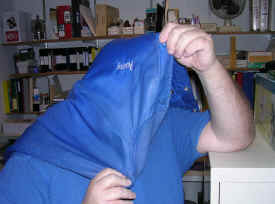 Avery makes news. Avery makes news. You may want to check out the "RAIN" report with Hap Holly, KC9RP this (or next) Friday. You just might know someone on the show. Our own Avery Finn, K0HLA, has risen to star status! Avery runs the Handiham Equipment Loan program and may be reached at:
avery.finn@courage.org. Listen to the latest RAIN Report in MP3 audio each week here:
http://www.therainreport.com/sound/rainreport.mp3
August 2006 magazine digest audio is posted at members only online for our blind and print-impaired members. The QST technical article overview will be read by Pat, WA0TDA, and will be completed by the end of this week. Bob Zeida, N1BLF, has completed the reading that is already online.
We are going to investigate the emerging "Daisy" format for our audio materials. If you are attending Minnesota Radio Camp and can help us by being in the Handiham Accessibility Discussion Group, please email Pat at:
patt@courage.org. DAISY stands for Digital Audio-Based Information System. Let me know if you think we should widen this discussion to other audio delivery systems. Email
patt@courage.org.
Last call for Minnesota Radio Campers: Camp one, camp all! Minnesota Radio Camp will begin on Wednesday, August 23 and finish on Wednesday, August 30. There will be an accessible VE session on Tuesday, August 29. Wheelchairs, service animals, and other adaptations are accommodated at Handiham Radio Camps. Sign language is also spoken at camp, and readers are provided for those needing that service during VE sessions.
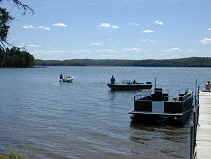
A complete ham radio station with tower and beam antenna allows us to work the world. High-speed Internet is available at Courage North. Our location on beautiful Lake George allows plenty of opportunity for lakeside activities, including maritime mobile operation from our wheelchair-accessible pontoon boats.
We can send you information and a Minnesota Radio Camp application packet. Call Nancy toll-free at 1-866-426-3442 or send her an email at
hamradio@courage.org.
Monday's Handiham EchoLink net is at 19:00 USA Central Time (Tuesday morning at 00:00 GMT) on the Minnetonka Radio Club 145.450 N0BVE repeater system here in the Twin Cities. On EchoLink, look for N0BVE, node 89680. The noontime net is at 12:00 CT, or 17:00 GMT Monday through Saturday.
Remember, you add five hours during the summer to convert Minnesota daylight time to GMT.
We are always looking for new material for the manuals directory for our blind members:
http://www.handiham.org/manuals
If you have anything to contribute in document, text, or mp3 audio, please contact
wa0tda@arrl.net.
| |

Let's ask Elmer!
Dear Elmer,
Last week I was listening on my local two meter repeater and heard some talking that sounded like a commercial radio station, then there was even some music. The audio level wasn't too high, but the repeater signal was strong, as usual in my location. It would come on, then go off for awhile before returning. I never did hear any identification. What was going on, and is there anything I should've done about it?
Signed, New Tech
Dear New Tech,
Sometimes when we are listening on repeaters, we can hear some pretty strange sounds. Intermodulation can occur when two radio signals mix due to some unexpected condition. This can cause the repeater to think it is hearing a regular input signal when in fact it is hearing this odd, unexpected signal instead. However, I don't think that is what is happening here. What you are describing sounds like an "open mike". An open mike made the international news recently when President Bush said a word he wishes he hadn't during a break at a conference. An open mike is one that is "listening" when we don't expect it to! When it happens on ham radio, it is usually embarrassing, annoying to other repeater users, always an illegal transmission when it goes out without identification, and even potentially dangerous, as it can tie up a repeater system during an emergency or public service event.
What probably happened was that a ham radio operator was driving to work, and the two meter radio in the car was turned on, tuned to the receive frequency of the repeater you were also listening to. What that mobile station didn't realize was that the microphone was on the driver's seat, and was being periodically keyed to transmit as the driver sat next to it. This can also occur when a handheld radio is in a pocket and gets sat on! Sometimes a passenger in the car or even a pet can key the rig without meaning to.
I'd say you should put out a call on the repeater stating that "someone has an open mike", and then identify your own station. Recently I also heard a station with an open mike. I made that call on the repeater, and listened after identifying my station. Soon the open mike transmission resumed, and, what was even worse, music was clearly heard in the background. I switched my receiver to the repeater's input frequency, which is the frequency the repeater is hearing the mobile stations on, and I could hear the mobile station transmitting directly without going through the repeater. This indicated to me that the station with the open mike was not too far away, but, since the signal quickly faded, it was a mobile station moving away from me. I made another call on the repeater, and continued listening. There was no further transmission from the open mike station, which meant that either the driver realized the mistake and corrected it, or drove out of repeater range.
 In a severe, long-term open mike situation, members of your club who are familiar with "fox hunting" or "hidden transmitter hunting" will probably be called upon to locate the offending transmitter and inform the owner of the problem.
In a severe, long-term open mike situation, members of your club who are familiar with "fox hunting" or "hidden transmitter hunting" will probably be called upon to locate the offending transmitter and inform the owner of the problem.
If you ever have an open mike yourself, you must correct the condition immediately when you discover it, and then identify your station as required by law. The best thing to do is to make sure you avoid open mikes in the first place by using a well-placed microphone holder and returning the mike to it when you are finished with a series of transmissions. That will keep it out of the way of passengers, pets, and even you, when you are busy driving.
One other thing. Never turn the audio on the mobile radio all the way down. That makes it IMPOSSIBLE to hear other stations calling you, including those who might want to tell you that there's an open mike! The other thing it avoids is you transmitting when you think there is no repeater activity, when, in fact, there is. This is very embarrassing. If you are disturbed by the audio from the mobile radio, simply switch the power off. That way you will not be fooled into thinking you are listening to a clear frequency when the repeater is being used.
His email address is:
elmer@handiham.org
Editor's note: No email is ever sent FROM the elmer@handiham.org address. This address has been harvested by spammers and used as a spoof address. Never open any email from Elmer's address. We report all such occurrences to the FTC.

RekkyTec Links
ARRL emergency and alternative power links:
http://www.arrl.org/tis/info/emergency.html
Connecticut Solar - a supplier of solar parts with a page about ham radio applications:
http://www.ctsolar.com/Amateur%20Radio%20Solar%20Power.htm
AFB's Access World online:
http://www.afb.org/aw/main.asp
Heat record report from Live Science:
http://www.livescience.com/environment/060714_record_heat.html HAMVENTION®:
http://www.hamvention.org
You wanna see a REAL antenna farm?
http://www.qth.com/w0aih/
Freedom Box:
http://www.freedombox.info
73 from all of us at the Courage Handiham System!
Pat, WA0TDA
Manager, Courage Handi-ham System
Reach me by email at:
patt@courage.org

ARRL is the premier organization supporting amateur radio worldwide. Please contact Handihams for help joining the ARRL. We will be happy to help you fill out the paperwork!
The weekly e-letter is a compilation of software tips, operating information, and Handiham news. It is published on Wednesdays, and is available to everyone in a choice of formats. To administer your subscription to the HTML version, go to:
http://www.handiham.org/mailman/listinfo/handiham-list.
The text-only version is at:
http://www.handiham.org/mailman/listinfo/handiham-text-list.
 In this special year-end edition you will find:
In this special year-end edition you will find:
 Streaming MP3:
Streaming MP3: Picture: Red Cross truck at
Picture: Red Cross truck at  Picture: Avery studies the 2006-2007 ARRL repeater directory.
Picture: Avery studies the 2006-2007 ARRL repeater directory.


 Avery makes news.
Avery makes news. 

 In a severe, long-term open mike situation, members of your club who are familiar with "fox hunting" or "hidden transmitter hunting" will probably be called upon to locate the offending transmitter and inform the owner of the problem.
In a severe, long-term open mike situation, members of your club who are familiar with "fox hunting" or "hidden transmitter hunting" will probably be called upon to locate the offending transmitter and inform the owner of the problem.
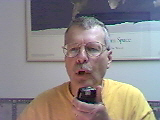 We are deep into a drought and heat wave here in Minnesota. High dew points combined with warm weather and frontal movements can bring severe weather, including high winds, tornados, and heavy rains with flash flooding. Yes, summer can be mighty uncomfortable, but this kind of hot weather presents us with the opportunity to make ourselves useful as emergency communicators in SKYWARN or other public service activities. I've talked about all that before, and I know you have taken steps to get your stations ready. So instead, I want to tell you about another summer phenomenon: summer VHF propagation.
We are deep into a drought and heat wave here in Minnesota. High dew points combined with warm weather and frontal movements can bring severe weather, including high winds, tornados, and heavy rains with flash flooding. Yes, summer can be mighty uncomfortable, but this kind of hot weather presents us with the opportunity to make ourselves useful as emergency communicators in SKYWARN or other public service activities. I've talked about all that before, and I know you have taken steps to get your stations ready. So instead, I want to tell you about another summer phenomenon: summer VHF propagation. Picture: Avery with phone. "Operators are standing by."
Picture: Avery with phone. "Operators are standing by."  Hello, Handiham readers and listeners!
Hello, Handiham readers and listeners!